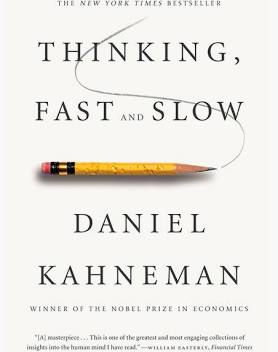Thinking, Fast and Slow
- Proteus Zolia

- Nov 26, 2023
- 3 min read
Updated: Feb 21
by Daniel Kahneman

Book Overview
Thinking, Fast and Slow is a profound exploration of the two systems that drive the way we think. System 1 is fast, intuitive, and emotional; System 2 is slower, more deliberative, and more logical. Kahneman, a renowned psychologist and winner of the Nobel Prize in Economics, dives deep into how these systems to shape our judgments and decisions. The book is a blend of psychology, behavioral economics, and personal anecdotes, providing insights into human reasoning and biases.
Power Line 1
Our Mind Operates on Two Levels: Fast, Intuitive Thinking and Slow, Rational Thinking
Imagine walking in a forest and suddenly seeing a snake; your heart races, and you jump back. That's System 1 at work - quick, instinctive. Now consider deciding whether to invest in stocks or bonds; this requires careful thought, analysis, and is driven by System 2. Kahneman illustrates that while System 1 is automatic and often beneficial, it's prone to biases and errors. System 2, although more reliable, is lazy and often defers to System 1. Balancing these two systems is crucial for effective decision-making.
Power Line 2
Heuristics and Biases Influence Our Judgments and Decisions
When you meet someone and instantly like or dislike them, that's an example of the 'halo effect,' a cognitive bias where our overall impression of a person influences how we feel and think about their character. Kahneman explains how heuristics, mental shortcuts that simplify decision-making, often lead to biases. These biases can distort our thinking, causing systematic errors in our judgments. Understanding these biases is key to improving our decision-making processes.
Power Line 3
Overconfidence in Our Judgments Leads to Errors
Consider a time when you were sure about an outcome, but it turned out differently. Kahneman points out that overconfidence is a common bias where we overestimate our knowledge and abilities. This overconfidence can lead to poor decisions, as we tend to ignore the uncertainty and risks involved. By being aware of this tendency, we can better calibrate our confidence levels and make more informed decisions.

"The confidence that individuals have in their beliefs depends mostly on the quality of the story they can tell about what they see, even if they see little."
Power Line 4
The Prospect Theory: We Value Losses More Than Gains
The pain of losing $50 is much stronger than the pleasure of gaining $50. This is the essence of the Prospect Theory, developed by Kahneman and Tversky, which shows that people react differently to losses and gains. We are loss-averse; losses are more emotionally impactful than equivalent gains. This theory revolutionized economics by incorporating psychological insights into human decision-making, challenging traditional economic models that assume rational behavior.
Power Line 5
Happiness is Influenced by Many Factors Beyond Wealth
Kahneman explores the concept of happiness, highlighting that it's not solely dependent on economic factors. While a certain level of income can improve life satisfaction, beyond that point, other factors like relationships, health, and personal goals become more significant. He differentiates between 'experiencing self' (in-the-moment happiness) and 'remembering self' (how we recall past experiences), providing a nuanced understanding of what influences our happiness.
Major Takeaway
"Thinking, Fast and Slow" offers a deep dive into the complexities of the human mind, revealing how our cognitive biases and heuristics often lead us astray. Kahneman's insights encourage readers to be more mindful of their thought processes, leading to better decision-making and a more profound understanding of human behavior. This book is a must-read for anyone interested in psychology, economics, and the intricacies of human reasoning.
Video Insights from the Author:
Spare few minutes and let Daniel Kahneman reinforce your knowledge about "Thinking, Fast And Slow".





Comments